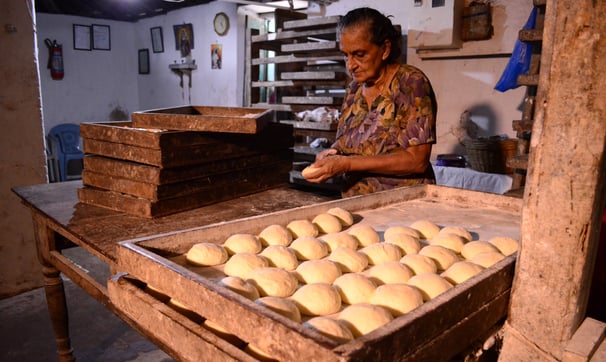Baking Tradition in Goa
COMMUNITY


The Heartbeat of Goan Villages: Celebrating the Poder, the Traditional Baker
In the heart of Goa's quaint villages, amidst the swaying coconut palms and the gentle rhythm of life, resides a figure as integral to the community as the church bell: the "poder," the traditional Goan baker. More than just a purveyor of bread, the poder is a cultural icon, a vital thread in the fabric of Goan society.
A Legacy of Warmth and Freshly Baked Goodness:
The poder's story is one of tradition, skill, and unwavering dedication. For generations, these bakers have risen before dawn, stoking the fires of their wood-fired ovens and kneading dough with practiced hands. The aroma of freshly baked bread wafting through the village streets is a daily ritual, a comforting reminder of home and community.
More Than Just Pão:
While the "pão," Goa's signature crusty bread roll, is the poder's hallmark, their repertoire extends far beyond. These artisans craft a variety of breads, each with its own distinct shape, texture, and flavor. From the flat and chewy "poi" to the ring-shaped "kankonn" and the soft, fluffy "unddo," the poder caters to every palate and occasion.
A Social Hub and a Community Pillar:
The poder's bakery isn't just a place to buy bread; it's a social hub, a meeting point for villagers to exchange news, share stories, and connect with their neighbors. The rhythmic tapping of the poder's knife against the bread board, the warmth of the oven, and the friendly banter create a unique and comforting atmosphere.
The poder also plays a vital role in community celebrations, providing bread for feasts, festivals, and religious ceremonies. Their presence is a constant, a reassuring symbol of continuity and tradition.
The Challenges of Modernization:
Like many traditional crafts, the poder's trade faces challenges in the face of modernization. Supermarkets and modern bakeries offer convenience and variety, but they often lack the personal touch and the authentic flavors of the traditional poder.
However, the poder's legacy endures, thanks to their unwavering commitment to quality and the enduring appreciation of their loyal customers. Many Goans still prefer the taste of bread baked in a traditional wood-fired oven, a testament to the poder's enduring appeal.
Preserving a Cultural Treasure:
The poder is more than just a baker; they are a custodian of Goan culture, a living link to the past. Supporting local poders is not just about buying bread; it's about preserving a valuable tradition, supporting local livelihoods, and ensuring that the aroma of freshly baked bread continues to fill the streets of Goan villages for generations to come.
Experiencing the Poder's Magic:
Visit a local bakery: Seek out a traditional "poder" bakery and experience the warmth and charm of their craft.
Try different types of bread: Sample the variety of breads offered by the poder, each with its own unique flavor.
Talk to the poder: Learn about their craft, their traditions, and their stories.
Support local poders: Buy your bread from local poders and help preserve their valuable trade.
The Goan poder is a treasure, a symbol of tradition and community spirit. Let's celebrate their craft and ensure that their legacy continues to thrive.
